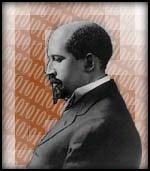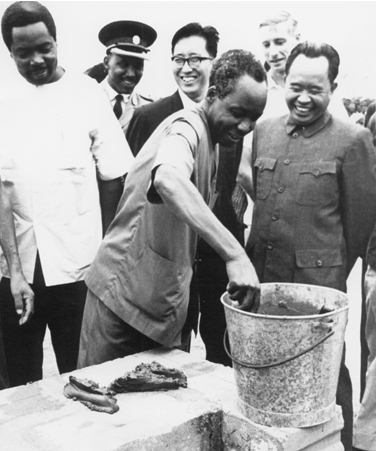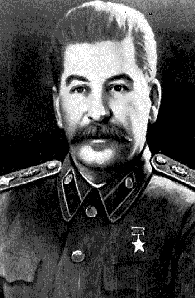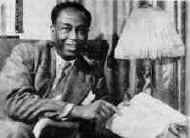![]() The Pan-African Movement
The Pan-African Movement ![]()
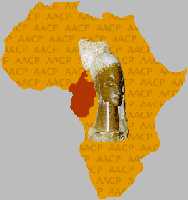
What prompted the movement
Many times we hear about different movements in history, but we are never given the facts of why these movements began in the first place. Take the Civil Rights movement. We are told that black people every where fought for equality, but we are not told that the civil rights movement started way before the walk on Washington lead by Martin Luther king Jr. So with the Pan -African movement, we decided to do things a little bit differently, instead of just telling you why it all started, or where it all began, I want to give you a little back ground on what made this all possible. I invite you all to journey with me back to Africa, and Asia, and all the other places in which slavery existed. Lest step outside of this new world that we live in and go back in history.
One of the questions that has continued to plaque my mind until this day, is why would anyone allow themselves to be enslaved? I always figured that everybody was the same, and that no on has the right to enslaved another human being. One thing that I had not added to this equation was the fact that, the people who enslaved others truly did not believe they were doing thing wrong, and they felt justified because the bible and the Koran, said that it was okay, or so they thought (Marah, 1998). Look with me on moment at this passage taken directly from the bible, in Leviticus 25:38; 44, 46.
It reads, " I am the Lord, your God, which brought you forth out of the land of Egypt to give you the land of Canaan, and to be your god. Both they bondmen, and thy bondmaids, which thou shall have, shall be of the heathen (pagan nations) that are around you; of them shall ye buy bondmen and bondmaids. And ye shall take them as inheritance for your children after you, to inherit them for a possession; " Now me reading this for myself, I would say that anybody outside of the United states are heathen and that gives me a right to take them as slaves, but that is not true. If the people who used the bible as a reference to justify slavery truly understood and read the whole bible, I believe they would have gotten a different take on it.
Slavery began because people with power were able to take over others that did not have as much power. It may be trouble some to think about slavery in this way, but it is the thing that cause the Pan- African movement. A quote from S. O. Arifalo, 1982, sums this up nicely. He states, Pan Africanism had its origins as a movement of intellectual protest against ill-treatment of blacks all over the world. It was initiated by the blacks of America and the West Indies whose ancestors came from Africa. In the words of Professor George Shepperson "Pan-Africanism was a gift of the New World of America to the Old World of Africa.' It was an expression of the feelings of the people of African stock about their condition of helplessness and degradation.
It was a movement created because black people all over the world were tired of having the slave mentality that had been passed on to them from their African ancestors. It was a movement that was created because Black people decide that they were better than how they were treated, and if they stuck together they new that they could change to world. The Pan-African movement was an "emotional, cultural, psychological and ideological movement that began among the African dispora in the Western hemisphere, for a closer purpose, so that African people could feel secure, attain political, economic as well as psychological power visa vis other races or world regions" (Marah, 1998).
 The
Future
of Pan-Africanism
The
Future
of Pan-Africanism 
Although the concept of Pan-Africanism has been around for over 100 years now the basis behind its appeal should and is still evident today. The effects of the movement have left us more aware of the injustices racially in the early 1900’s. Culturally, socially, and historically the movement formed such strong resistance against a white world. For our society to maintain its consciousness of the resistance against racism will help us to thrive with all races and cultural backgrounds.
The future of Pan-Africanism lies in the strength of our society and our ability to bring together young people, workers, political organizers, trade unionists, women activists and intellectuals behind a common vision of black empowerment at a global level. We are the ones that will continue the goals that were emphasized and thought of all the way back to W.E.B Dubois. The new Pan-Africanism must first challenge the structures of patriarchy within black communities and black organizations, creating more egalitarian relationship between black women and men. So long as we let oppression between races exist, the liberation movement for the races will never be accomplished.
The new Pan-Africanism must stress other qualities along with racism. There should be stances that speak for environmental issues and natural resources of the world. Three-fifths of all toxic waste dumps are found near black or hispanic communities. When creating a connection with environmental organizations and green political parties this will link a struggle against racism to a safe, clean environment. I feel the this is no longer just an African American issue but an multi-cultural movement that should speak against all racial prejudices and injustices.
The Pan-African Movement of the next century cannot be defined into biological, genetic, or racial categories, but rather in terms of its politics and social vision. Race is a category of anti-black exploitation, a product of slavery, white supremacy, and economic domination. Race today not only attacks this but attacks the humanity of an entire spectrum of people including for example Hispanics and Turks in Germany. The movement against racism is now extended to a global international level.
Pan-African Leaders
W.E.B. DuBois was one of the first African-Americans to support the idea of Pan-Africanism. He attended the first Pan-African Conference in London in 1900. He later organized the conferences held in Europe and in America.
Although Dubois was a significant leader in the origins of the Pan-African Movement, it is imperative to understand why the imperialist powers were able to continue to exploit Africa. We can begin with the relationship between the Western world and leaders like Julius Nyerere and Kwame Nkrumah. Western governments encouraged them to provide limited welfare measures, particularly health care and education. The World bank underwrote their schemes for industrialization and agricultural development. The colonial authorities ha, in many cases, drawn up plans for these projects before independence was granted. Tanzania under Nyerere became on of the world's largest recipients of the World Bank loans. Without this support, the Pan-Africanists' administration would not still be existent.
Nkrumah was the first of the Pan-African leaders to come to power. His journey from prison cell to government was a pattern that was to be followed in an increasing number of colonies, as the British sought to maintain their power in Africa. The more Nkrumah cooperated, however, their suspicion of Pan-Africanists resided.
Joseph Stalin was the next great influence during the time of World War II. To continue the progress of the movement, he disarmed the worker's movement. After Stalin had done this, he attempted to make an alliance with other world powers by selling oil to Mussolini when he invaded Ethiopia and signed a pact with Hitler. When Stalin tried to make an alliance with Great Britain, he ordered members of the communist party to drop their support for anti-colonial movements. This discredited socialism in the eyes of many supporters, impacting India the most.
The betrayal of the Indian anti-colonial struggle had indirectly affected the Pan-African movement (at this time, the organization was still American based.) George Padmore, a leading West Indian communist party member decided to leave the communist party and join the Pan-African movement. He successfully turn this organization into an African based movement by portraying it as the only combat to the imperialistic struggle.
Pan-Africanist leaders were able to maintain the ability to do as they see fit, mainly because of the Cold War. If they decided to step over their boundaries, however, they could have been become an enemy to the western world. Actually, the Belgian, British, and U.S. governments all concluded that Patrice Lumumba had to be murdered when he called on the Soviet troops to support his government in the Congo. On the other hand, others like Nyerere survived because of the support he gave the Western governments during the Cold War.
A very persuasive quote by Marcus Garvey states:
UP!UP! You Mighty Race! You can Accomplish What you will! I repeat that God created you masters of your own destiny, masters of your own fate, and you can pay no higher tribute to your Divine Master than function as man, as He created you. "A people without knowledge of their past and history is like a tree without roots!" AFRICA FOR THE AFRICANS!
Even today, some experts partly blame the Pan-Africanists for the continued exploitation of Africa. This is concluded because they continued to pursue economic and political policies that has kept Africa bound by the world powers.
![]()
Pan-Africanism and Education
By: Kenneth James King
King bases the book on describing in detail the education offered to African American’s and African’s in the United States in the early 1900’s. The book focused on the African initiative and determination in the search of a fuller education in America against a background of often-conflicting white and American Negro counsels. But this claim for concern for Pan-African education was the basis behind the development of one agency, the Phelps-Stokes Fund, which fought for the “education of Negroes, both in Africa and the United States.” But one on the strong beliefs behind the Pan-African movement education was that Africa should learn from the example of the African South.
King, Kenneth James. Pan-Africanism and Education, A study of
Race, Philanthropy, and Education in the southern states of America and
East Africa, Clarendon Press, Oxford. 1971.
The Pan-African Movement
By: Imanuel Geiss
Geiss writes of the Pan-African Movement in America and Europe up into 1968. He describes the Movement as one of the most political movements in history, and portrays W.E.B Dubois as the leader of the father of the Pan-African Movement. He tries to pin down the real focus of the movement and defines its cause in many ways. Geiss stressed ideas of cultural unity and political independence of Africa, with ambitions to modernize Africa on a basis of equality of rights. But the one phrase that was evident all throughout the movement was ‘Africa for the Africans’. He then describes the processes through history of the movement including those of the Pan-African Congress and the effects internationally in England, France, and of course Africa.
Geiss, Imanuel. The Pan-African Movement, A History of Pan-Africanism in America, Europe and Africa, Africana Publishing Co. New York, 1968.
African People in the Global Village
An Introduction to Pan African Studies. I believe that this book is a wonderful book to read if you want to get some history on Pan-Africanism. It not only contains information on the subject of Pan Africanism, but also contains information on what made the movement possible, the state of ancient African and the modern version of Africa. It contains host of information on African politics, black male and female writes and so much more. If you want to know a little bit more about the fall of the African empire, this is the book to see. It is not written like any test book, and it is clear and understand able. If you have any other history papers to write about Africa, and its people, chose this book, you will not regret your choice.
John K. Marah. African People in the Global Village, An introduction to Pan-African Studies. University Press of America, 1998.
This book discusses the purpose for the Pan-African Conference of 1960. The third annual conference was held in Philadelphia at the University of Pennsylvania from June 22-26, 1960. The theme was, "African Unities and Pan-Africanism." Throughout the book, the author's compiled discussions, interviews and papers concerning the main conclusions of the event. The basis was that if African states were going to become united, they needed the defense of Pan-Africanism, just as the America needed Pan-Americanism. Pan-Africanism would provide the motivational force to prevent political, economic and military rivalries between the African nations.
American Society of African Culture. Pan-Africanism Reconsidered. Berleley: University of California Press, 1962.
![]()
Read Nelson Mandela's address on behalf of the ANC delegation to the Conference of the Pan-African Freedom Movement of East and Central Africa on this cite.
http://www.anc.org.za/ancdocs/speeches/pafmeca.html
This site offers twenty links on different areas and views of the Pan-African Movement.
http://www.panafricanconnection.com/panafrican/links.html
Check out this Pan-African Perspective!! It includes the latest news on what is happening today and read up on African Liberation Day. Dr Motsoko Pheko, Deputy President of the Pan Africanist Congress of Azania and a member of the South African Parliament, speaks on The Road to Pan-Africanism.
http://www.panafricanperspective.com/index.htm
This is a site for information on the fifth Pan-African Conference. If you would like to know about some of the events and happenings of today take a look at this site.
http://www.pwpa.org/International/Photos/99sa7.html
To learn more about the life of W.E.B. DuBois, "father of the Pan-African Movement' view this thorough page.
http://americanhistory.miningco.com/homework/americanhistory/library/weekly/blduboi2.html
This is a book review on the struggles that the African people have in non-violence.
http://store.yahoo.com/africanworld/0865437513.html
Check out this web site if you want to see where famous Black Artist's are going. I think this is a pretty important page to look at because it represents what Pan-Africanism was all about. It was all about expression and unity, and having a name for yourself, and this website promotes just that.
http://www.liu.edu/cwis/cwp/library/african/movies.htm
This site I believe would prove very useful if you want to get some information on what is happening now with the Pan-African Movement. It talks about the new leaders involved and where the African people stand in regards to the movement. If your interested check it out.
http://rufp.org/News_Coverage/pan_africanism_on_the_rise_again.htm
I think that many of you may like this website. There is some talk about creating a new village in Africa where Panafest could be celebrated. Panafest is a celebration of Africa and all that is African. It will be a place where people can come and do research, look at African art, and indulge in some African culture.
http://www.panafest.com/Rebirth.html
This site provides a public statement released from the Pan-African Movement and describes the anger felt over the death of Chief Abiola, the president-elect of the Federal Republic of Nigeria.
http://www.prairienet.org/acas/abiola.html
Learn about the hidden history of world wide Africa through El Haj Malik El-Shabazz (Malcom X), W.E.B. Du Bois, Marcus Mosiah Gravey, Martin Luther King, Nelson Mandela and many more. This site links to various other sites on the Pan-African Movement as well as all different aspects of African American history.
http://www.angelfire.com/ny/PanafricanColours/Page1.html
If you guys are looking for a web site that will help you out in class, this is the one to visit. This web sites gives very brief, but substancial information about the life of Marcus Garvey. He was on of the fathers of Pan-Africanism. I think that everyone should check out this site.
http://www.swagga.com/marcus.htm
![]()
![]()
Chrissy’s Over-View
Also when reading, Pan-Africanism and Education by Kenneth James King and The Pan-African Movement by Imanuel Geiss, I gained a new perspective of what it means to fight for equality in all ways. First I learned this from King, when he speaks of the fight Africans took for a proper education system. And secondly, Geiss speaks on the struggles experienced in many different countries for the sake of the Pan-African Movement.
The website search on Pan-Africanism proved to be very successful.
So many sites gave excellent access to a greater understanding of
the topic. I even found one
site that had 20 links to information on Pan-Africanism.
One of my favorite links that I found was the one from
angelfire.com, this seemed to have so much to learn about the movement,
African American history and numerous African American leaders. Another
interesting site was the Pan-African Perspective.
Through the research of Pan-Africanism, I have learned some of the perspectives of the movement. First of all, I realized that because this topic started off as an idea to somehow unite African Americans. This group would become an organization that would support their cause. Other leaders, however, adopted this idea so that the countries in Africa don’t war against one another. I also realized that the struggles that the countries went through were primarily due to exploitation.
I want to personally say that this web page idea was fabulous. It gave me the chance to really express my ideas in creative ways, and through various means. I not only was able to talk about the book I read, or the web-sites that I found, but I am also able to share all of that information with others visually, so that they can have a hands on experience as well.
One of the web-site articles that I liked was on Panafest.
I liked it because it was something I never herd of before, so it
grasped my attention, and I had to read it.
I think that Panafest should be incorporated into the multicultural
activities on campus, because it celebrates blackness.
It does not just talk about life in the past for African Americans,
but it shares the future, and modern ideas, and cultures of all people of
African lineage. I think that
it is a very good article to explore.
The book I reviewed on Pan-Africanism is a very good textbook to
read through for future projects containing African politics, the history
of Africa, and the government that is established there.
This book open my eyes to things that I could not even image
existing in Africa. Everything
presented in this page has been place intricately and delicately just for
the pure enjoyment of the viewers. I
believe that you all will have just as much fun exploring the depths of
Pan-Africanism as I have had creating the path for you to enjoy.
![]()
African People in the Global Village

The Pan-African Perspective and the latest news on the Movement.
Nelson Mandela’s address to the Pan-African Freedom Movement
Twenty great links on Pan-Africanism!
A public statement released by the Pan-African Movement.
A great historical site that includes information on many African American leaders.
For more information on Black Artist and the movement click here.
What's happening now with Pan Africanism.
Panafest; what is it, and why is it important.
For information that may help you on our exam click here.
Pan-African Leaders
(Click on the picture or name to learn more about each leader)

